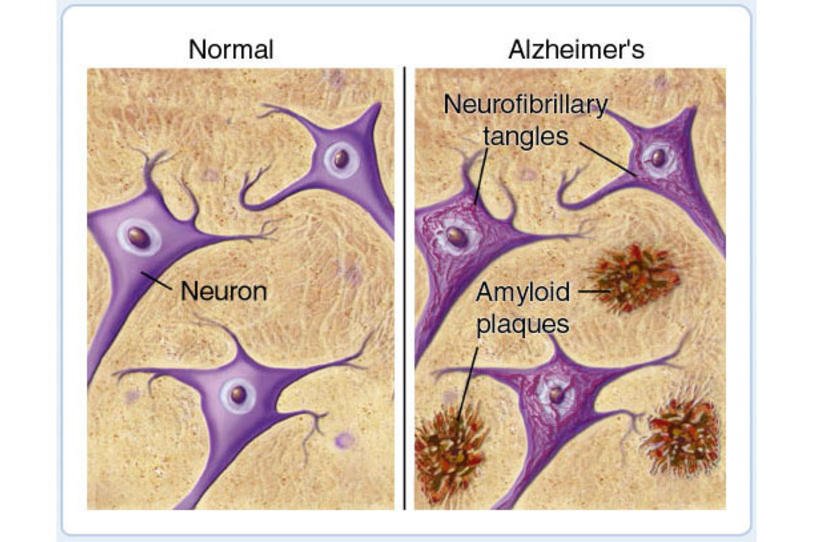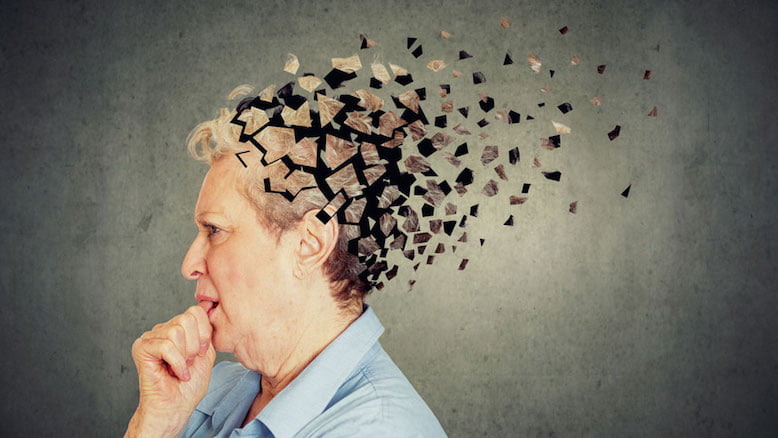Alzheimer’s disease is a neuro-degenerative disease in which brain cells stop working or die. This disease destroys the person’s thinking skills and memory. It is mostly commonly observed in mid 60s. It is the cause of 50–70% of cases of dementia. The most common and early symptom is the difficulty in remembering current events. As the Alzheimer’s disease get advance, the symptoms also starts appearing such as disorientation (confused state), mood swings, loss of motivation, self-negligence, and etc. As the disease progress, the patient withdraw themselves from family and the society. Gradually, the bodily functions are lost and ultimately leads to death. Although the speed of progression may vary, but the typical life expectancy is of three to nine years.
Till now the cause of the Alzheimer’s disease is poorly understood. The robust genetic risk factor is from an allele of APOE. Other risk factors may include a history of the head injury, then high blood pressure and etc. A feasible diagnosis is based on the history of the illness and then cognitive testing with the medical imaging and the blood tests to see out other possible causes. Early symptoms are often mistaken for the normal aging. The inspection of the brain tissue is needed for a definite diagnosis, but this can only be done after the death.
The socio-economic, social and physical state of the person affect the probability of affecting the disease. Good nutrition, physical and social activities could be the best medicine for preventing the disease. So far, we do not have any medicine that could reduce the risk or reverse the symptoms.
History –
The German psychiatrist Alois Alzheimer recognized the first case and therefor the disease is called as Alzheimer’s disease. The patient’s name was Auguste D. He monitored her case until the she died in 1906. In subsequent five years, eleven similar cases were reported within the medical nomenclature, a number of them were already using the term Alzheimer’s disease. The disease was first designated as a characteristic disease by Emil Kraepelin (co-worker of Alois Alzheimer) after subduing some of the clinical misconceptions and hallucinations changes in the original report of Auguste D.
Eventually, Alzheimer’s disease was formally adopted in medical taxonomy to designate the individuals of all ages with the common symptom pattern, disease course, and neuropathology.

What is the Alzheimer’s disease?
Alzheimer’s disease is the known type of dementia.
- It’s a progressive disease beginning with a light amnesia and possibly resulting in loss of the power to hold out their daily activities.
- Alzheimer’s disease mainly affect the parts of the brain that control memory, language and etc.
Who has Alzheimer’s disease?
- As per brightfocus.org, there are 50 million patients of 2020 of Alzheimer’s disease.
- Beyond the age of 65 the number of people living with this disease doubles every 5 years.
- This number is estimated that it can touch nearly triple by the year of 2060.
- Symptoms of the disease first appear after the age of 60, and the risk increases with the age.
What causes Alzheimer’s disease?
In current years, scientists have made tremendous progress in their better understanding in Alzheimer. Scientists so far fully understood that what causes Alzheimer’s disease. People with early-onset Alzheimer’s, a mutation might be the cause and thus the Late-onset Alzheimer’s arises from a compound series of brain.
Risk factors of Alzheimer’s disease:
Scientists so far fully understood that what causes Alzheimer’s disease.
Age: Increasing age is the greatest well-known risk factor for the Alzheimer’s disease.
Family history: The risk of evolving Alzheimer’s is slightly higher if a first-degree connected to your parent or sibling. Most genetic mechanisms of Alzheimer’s among families remain mostly unexplained, and the genetic factors are complex.
Down syndrome: Several people with the Down syndrome develop Alzheimer’s disease. Symptoms of the disease likely to be appear in 10 to 20 years earlier in the people with Down syndrome.
How does Alzheimer’s disease affect the brain?
Scientists still untangle the complex brain changes involved during this disease. Changes in the brain might begin a decade before showing the symptoms. During the very early stage of the disease, toxic changes takes place in the brain, including abnormal buildups of proteins that form amyloid plaques and tau (microtubule protein) tangles. Earlier healthy neurons stop functioning then they lose the connections with the other neurons, and then die. Damage initially take place in the hippocampus and the entorhinal cortex, which are the essential parts for forming the memories. As more the neurons die, the parts of the brain are affected and it begin to shrink. Therefore, by the final stage of Alzheimer disease, the damage is widespread and brain tissue has totally shrunk.
It caused by the abnormal accumulation of proteins in brain namely amyloid and tau (microtubule protein). The amyloid forms plaques around the neurons whereas the tau protein get deposit and form tangles within neurons. Neurofibrillary tangles (NFTs) are aggregates of hyper phosphorylated tau protein that are most commonly known as a primary biomarker of Alzheimer’s disease. Their presence is also found in several other diseases termed as tauopathies. The scientist are still in the process of understanding the reasons of accumulation. Due to the accumulation of proteins, the neurons are unable to interact and transmit the signal. Due to the poor interaction among neurons, the level of acetylcholine reduces. Gradually, the brain shrinks and primarily affect the part of the brain that is involved in memory. Later, it may affect other parts of the brain impairing vision and language.

Signs and symptoms of Alzheimer’s disease.
Memory loss is the main indication of Alzheimer’s disease. It includes difficulty in remembering the recent events. As the disease develops, memory cognitive impairment worsen. People with memory problems have a condition called the mild cognitive impairment (MCI). With MCI, people have more memory problems than the normal condition, but their signs do not interfere with their everyday lives. Older people with the condition MCI have greater risk for developing Alzheimer’s. Researchers are studying biomarkers to detect the early changes in the brains of people. But more research is necessary before these techniques are used broadly to diagnose the Alzheimer disease.
Memory
Memory problems are characteristically one of the first warning signs of the Alzheimer’s disease and related dementias. Everyone has occasional memory lapses, but the amnesia related to Alzheimer’s disease is bit different. They repeat the statements over and over. Forget discussions, actions and cannot recall them later. They get lost in known places. In due course of time they forget the names of the family members.
Thinking and reasoning
Alzheimer’s disease causes difficulty concentrating and thinking.
Multitasking is particularly difficult, and it may be thought-provoking to manage finances such as balance checkbooks and paying bills on time. In the due course of time, an Alzheimer patient unable to recognize and deal with the numbers.
Making judgments and decisions
In Alzheimer disease deterioration caused and the ability to make any type of sensible decisions and judgments in everyday situation
Changes in personality and behavior
Brain alterations that occur in Alzheimer’s disease affect moods and behaviors. Problems may include such as:
- Depression
- Social withdrawal
- Mood swings, Distrust in others
- Irritability and aggressiveness
- Changes in sleeping habits
- Delusions
What to do if you suspect Alzheimer’s disease?
Getting checked by your doctor and determine that the symptoms you are undergoing that are related to Alzheimer or not. Early and precise diagnosis will provide opportunities for you and your family to consider financial planning, develop advance commands, enroll in medical trials, and anticipate care needs.
Stages of Alzheimer’s disease:
Mild Alzheimer’s disease
As the Alzheimer’s deteriorates, people experience superior memory loss and other reasoning complications. Problems include nomadic and getting lost, trouble in handling money and paying the bills, then asking the same questions repeatedly, taking longer to complete normal daily tasks, and mood swings and behavior. People are mostly diagnosed in this stage only.
Moderate Alzheimer’s disease
In this phase, damage mainly occurs in areas of the brain that controls the language, mindful thought, and sensory processing, such as the ability to correctly detect sounds and smells. Memory loss and the misunderstanding grow poorer, and people begin to have problems recognizing family members, friends and everyone. They are unable to carry out multistep tasks for example, getting dressed, or handle with the new situations. In addition, people at this phase also have hallucinations, delusions, and paranoia and act unwarily.
Severe Alzheimer’s disease
In this phase, plaques and tangles spread all over the brain, and brain tissue shrinks. People with severe Alzheimer’s unable to communicate and are absolutely dependent on others. During this end of life, the person may be in bed most of the time.
How is Alzheimer’s disease diagnosed?
Doctors use several methods and tools to unravel the problems.
Ask the person and a loved one or friend questions on overall health past medical problems, ability to carry out daily activities, and changes within the behavior.
They conduct various tests of memory, problem solving and etc., also carry out standard medical tests, for example blood and urine tests, to recognize the other possible causes of the problem.
Perform brain scans, such as computed tomography (CT) then positron emission tomography (PET) or magnetic resonance imaging (MRI).
How is it related to apoptosis dysregulation?
Extensive loss of the neuron takes place in Alzheimer disease brain and some authors have risked that dysregulation of apoptotic death paths is etiologically answerable for the disease. Apoptosis is mainly regulated in mammalian cells by a family of cysteine proteases called caspases.
How is Alzheimer’s disease treated?
Medications used to treat the reasoning problems of the Alzheimer’s disease contain: four acetylcholinesterase inhibitors (tacrine, rivastigmine, donepezil and etc.) and memantine, an NMDA receptor antagonist.
Medications to maintain mental function –
Several medications are approved by the U.S that Food and Drug Administration (FDA) helps to treat the signs of the Alzheimer disease. Donepezil, rivastigmine, and etc. medications are used to treat the symptoms of mild to moderate Alzheimer conditions. Then the medication of memantine and donepezil are used to treat the moderate to severe Alzheimer condition of a patient. These all the drugs mainly work by regulating the neurotransmitters, which is mainly the chemicals that transmit messages between the neurons. However, these all the drugs don’t change the original disease process but it helps only for a limited amount of time.
Medications to treat the disease –
Aducanumab is the first disease-modifying therapy approved by Food and Drug Administration to treat the Alzheimer’s disease. This medication helps to decrease the amyloid deposits within the brain and also help to slow the event of Alzheimer’s, albeit it’s not affect clinical outcomes. A doctor will probably give tests, such as a PET scan or study of cerebrospinal fluid, for the evidence of amyloid plaques and will help to decide if the treatment is right for that patient or not.
Managing Alzheimer’s disease behavior –
Common behavioral symptoms of Alzheimer’s include sleeplessness, agitation, anxiety, aggression and etc. Scientists are trying to know that why these symptoms occur and are also trying to study. Research has presented that it the behavioral symptoms are treated then it can make people with Alzheimer’s easier and makes things peaceful.
Support for families and Alzheimer’s care giver –
Caregivers have found that joining a support group may be a critical lifeline. These groups allow caregivers to seek out, express concerns, share their experiences, getting tips, and receive the emotional comfort. There are many organizations that promote in-person and online support groups, including groups for the people with their early-stage of Alzheimer’s and their families.
References –
https://en.wikipedia.org/wiki/Alzheimer%27s_disease
https://www.mayoclinic.org/diseases-conditions/alzheimers-disease/symptoms-causes/syc-20350447
https://www.nia.nih.gov/health/alzheimers-disease-fact-sheethttps://www.alz.org/alzheimers-dementia/what-is-alzheimers


